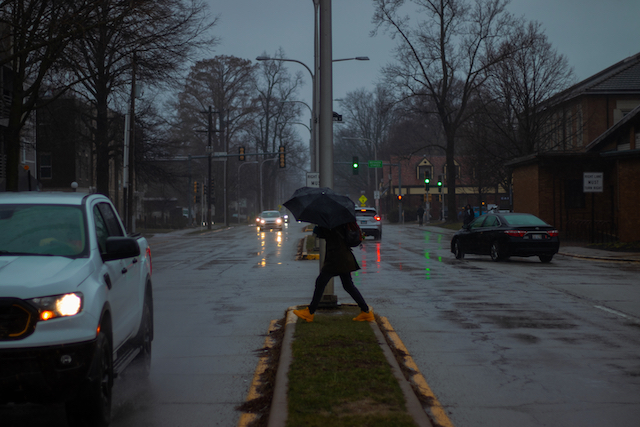Climate expert says weather becoming more volatile

Rain pelts South Lincoln Avenue in Urbana during volatile weather on March 3. Climate expert Don Wuebbles said wetter winters and springs will become the norm. Mae Antar
Three tornadoes touched down in Champaign County Feb. 27, followed by a week of volatile weather patterns.
Less than a week later, locals saw heavy winds, rainfall and snow.
These weather patterns could become more common as we continue emitting greenhouse gases like carbon dioxide, said Don Wuebbles, a climate expert at the University of Illinois Urbana-Champaign.
"[Greenhouse gases] are natural, but we're adding to the amount of them because of human activities … making the atmosphere more energetic,” Wuebbles said. "[It's] not surprising that we're seeing more severe weather happening because of that increased energy."
We need to be at net zero emissions, and to do that, there needs to be a change in our transportation and energy systems soon, Wuebbles said.
While the University of Illinois and Champaign have taken proactive steps to mitigate these issues by introducing solar and wind energy to the area, they are not being implemented fast enough due to tight budgets, he said.
"We've got basically 20 to 30 years to,” Wuebbles said, “essentially eliminate our emissions."
Carbon dioxide levels impact not only our weather but our local crops as well, according to the 2021 Illinois Climate Assessment, which Wuebbles co-led.
The report states that these changes in weather have the capability of greatly impacting farming in central Illinois.
Among the findings: "Crops and livestock in Illinois are negatively impacted by weeds, pests, and diseases, which are expected to increase because of warmer winters, increased spring precipitation, and higher summer temperatures."
He said that carbon dioxide does help crop growth, but over time the increased carbon dioxide levels can actually decrease crop yields.
"Summers are expected to be much warmer but also drier," said Wuebbles. "So we're going to deal more with, you know, potential drought conditions in the summer as the soils dry."
These drier conditions, due lack of local rivers and streams, will force farmers to turn irrigation via aquifers, he said.
The assessment's research points to a potential impact on the local Mahomet Aquifer. Wuebbles said that this could potentially cause water issues for local communities.
It states: "Heat and water stress are likely to reduce corn yields by mid-century in Illinois."
According to the Illinois State Climatologist Site, 74 deaths are attributed to the heat, whereas 18 are attributed to the cold annually in Illinois.
Cold deaths would become less of an issue, but there is an increasing concern for heat deaths, but there is hope, Wuebbles said.
"Heat waves are going to be more and more of an issue,” he said. “We can adapt to that. We can be better prepared.”

